You wouldn’t build an addition on your house and ask afterwards how much it cost, would you? Of course not – that would be ridiculous! If you waited to find out the price until after you built, you would have already incurred the cost and be responsible for the money you owe for the addition whether you could afford it or not. Nobody makes big, expensive decisions that way. First, you estimate the costs, you determine if you can afford it, and then you do a cost-benefit analysis to see if it is worth it.
This is how most people make decisions and we expect the same cost-benefit analysis from our government. After all, we have to pay for the decisions they make. This is why it is so concerning to see what is in the new 2045 Comprehensive Plan Draft AND what is NOT in it – there is no fiscal analysis. The City was supposed to have a fiscal analysis done prior to writing the comprehensive plan draft. The City chose not to have it done. What will the new development in the 2045 Comprehensive Plan cost? We don’t know, but it could potentially saddle us, the taxpayers, with huge infrastructure costs for decades to come. The lack of due diligence on the City’s part in making these recommendations without the fiscal analysis is concerning.
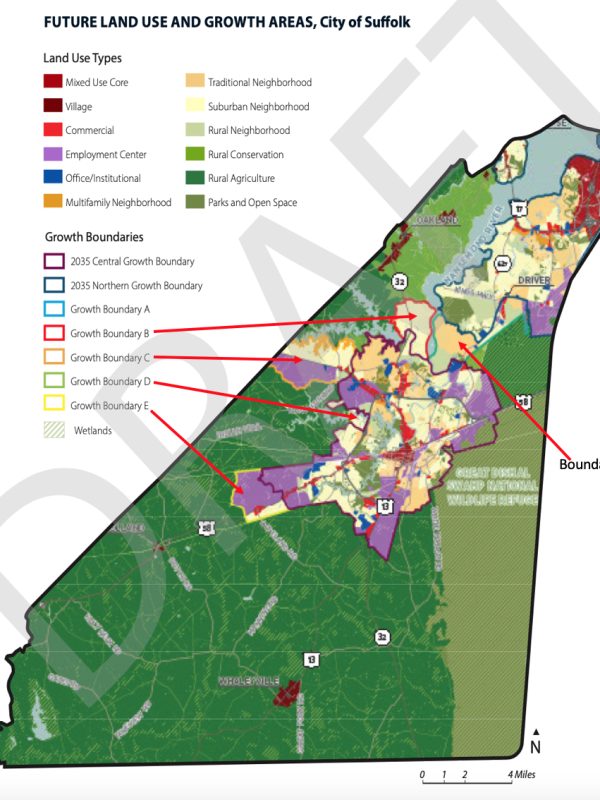
This image shows a map of Suffolk from the 2045 Comprehensive Plan Draft (p. 41) with the new and current Growth Areas. The red arrows have been added by Care4Suffolk to help show where the new growth areas will be.
Suffolk city managers and planners want to expand the city’s Growth Areas by almost 25%, prioritizing “land use type” changes to allow for a lot more industrial and suburban growth. Almost all the proposed new growth area is currently agricultural or low-density rural residential, adjacent to our water supply reservoirs. Turning rural areas into suburban residential and industrial areas is sprawl. Sprawl comes with a high price tag for infrastructure costs – roads, water, sewers, schools, and emergency response services.
This image is from the Fiscal Impact Analysis Report from the City of Eagle, Idaho (p.24). This is an example of the type of information from a fiscal analysis that provides valuable insight for a city to use in planning future development. The City of Eagle is looking at long-term Net Fiscal Impact for development in a specific area.
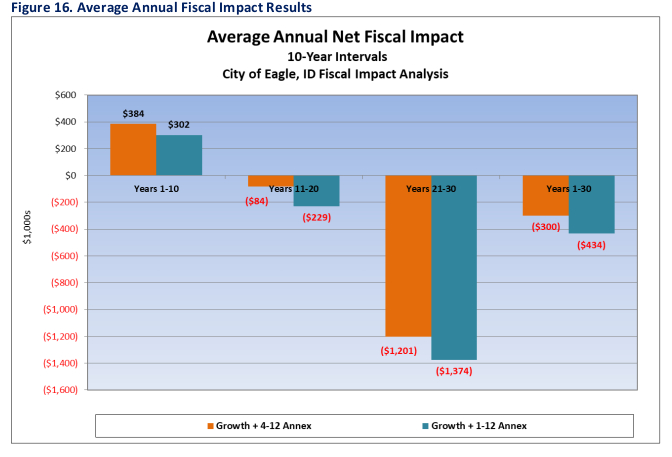
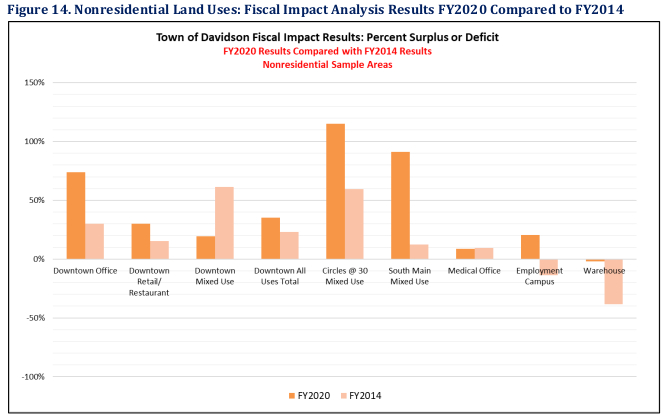
This image is from the Cost of Land Use Fiscal Impact Analysis for the Town of Davidson, North Carolina (p. 17). The Town of Davidson is comparing the fiscal impact (surplus vs deficit) of various non-residential land use types from 2014 compared to 2020. Notice that the warehouses are net negative, from 2014 to 2020.
During the planning process, the City sought public feedback and heard many concerns and frustrations regarding the rapid expansion in the last decade. Citizens are suffering from traffic congestion, unsafe roads, insufficient schools, increasing taxes, and lack of adequate public services. Considering the public pushback on development of warehouses and high-density housing in recent years, one would expect city managers and planners to go out of their way to justify why they recommend 17 square miles of additional suburban and industrial development in the new 2045 Comprehensive Plan draft. You would think that in order to alleviate our concerns they would be eager to demonstrate how all this benefits the city as a whole and improves our quality of life. The City has not done this. Instead, we are left with additional concerns about the lack of due diligence in the process.
The City of Suffolk has paid over a million dollars to create this plan. We expected that the City would analyze costs and impacts of growth and development as part of this new plan. We expected a thorough analysis of a variety of growth scenarios, weighing the costs versus benefits. We expected the City to provide specific strategies, goals, standards and methods of accountability. Yet, this has not been done.
The Fiscal Impact Analysis should have–and could have– been completed already according to the initial requirements of the contract with the consultant, but the City specifically asked to delay it. Below are all the records that show that contrary to the original agreement, the City of Suffolk asked to have the Fiscal Impact Analysis delayed and only done AFTER the new 2045 Comprehensive Plan is approved.
In November 2020, the Suffolk Purchasing Division put out a Request for Proposal (RFP) for “Review and Update of the 2035 Comprehensive Plan.” It contains a “Scope of Services,” (p.6-11) which lists what the City feels are the desired components “essential for reviewing, evaluating, and updating” the 2035 Plan by a potential contractor/consultant. One of these desired components was “Development of an appropriate fiscal analysis format and model; and review, update, and prepare fiscal impact analysis of future and preferred development scenarios” (p.6).
In January 2021, the consulting firm, Planning NEXT, presented its proposal to review and update the 2035 Plan. Their Scope of Work talks about fiscal analysis and “alternative land uses and build out scenarios” that they will prepare to “be compared with a set of metrics developed in collaboration with Staff” (p10-11). It states that they “will conduct an analysis to help determine the most advantageous types of economic development” (p12) and a Fiscal Impact Analysis is clearly listed as a specific task within the Technical Analysis component of the document (p12). The Plan Development component of the proposal lists a task to “Develop fiscal impact model tool and reports,” to include a “Growth Impact Report” as a “stand-alone document, that is easily understood by all interested parties” (p15).
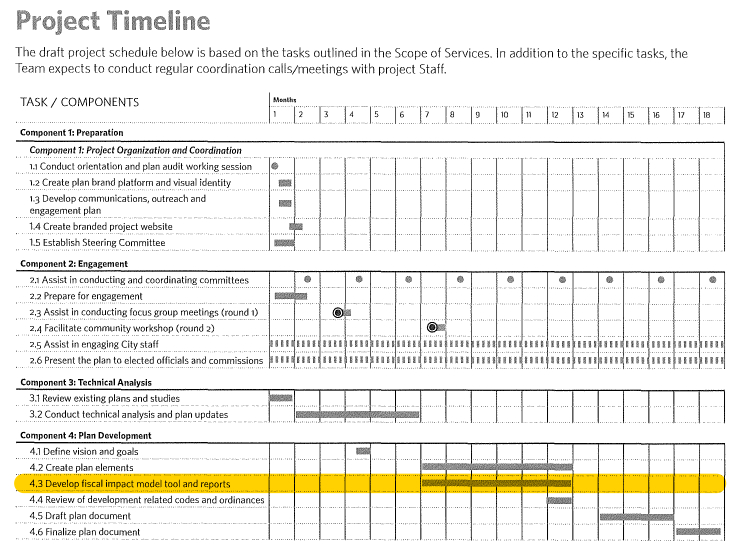
The image above is an excerpt from the Proposal: Review and Update of the Comprehensive Plan Suffolk, VA (p. 18) which is from Planning NEXT (January 20,2021). The highlighted section shows that the plan originally included a fiscal analysis that was to be completed prior to writing the comprehensive plan draft.
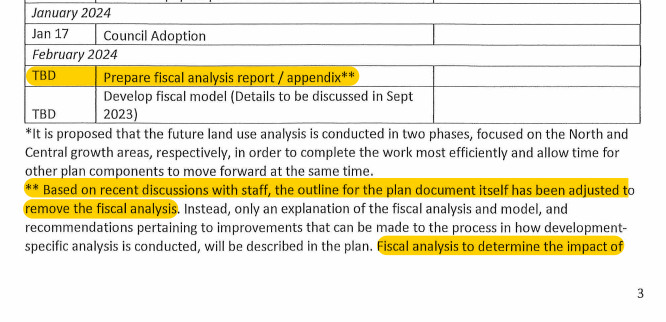

The images above are excerpts from the Scope of Work Amendment from Planning NEXT dated August 29, 2023 (page 3 on left and page 4 on right). These excerpts show that there was a change from the original plan where the City has made the decision to postpone the fiscal analysis until after the 2045 Comprehensive Plan is approved.
Suffolk’s city managers and planners decided they wanted to wait until AFTER the 2045 Plan was approved by City Council to have a thorough Fiscal Impact Analysis done. They want to approve this new growth plan without knowing the short-term or long-term costs. A Fiscal Impact Analysis is a standard recommended part of the comprehensive plan process. The consultants hired to help develop this plan both recommend, and routinely complete, these studies for the other cities that hire them.
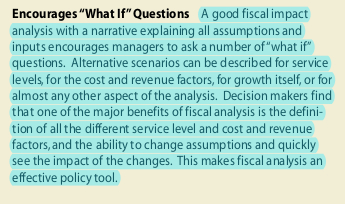
This is an excerpt from Fiscal Impact Analysis: How Today’s Decisions Affect Tomorrow’s Budget by L. Carson Bise II of TischlerBise. This excerpt explains what an important tool the fiscal analysis can be for planners while making decisions like the ones made in the 2045 Comprehensive Plan. TischlerBise is the consultant that was going to conduct the fiscal analysis. Full document available at the end of the article and on their website.
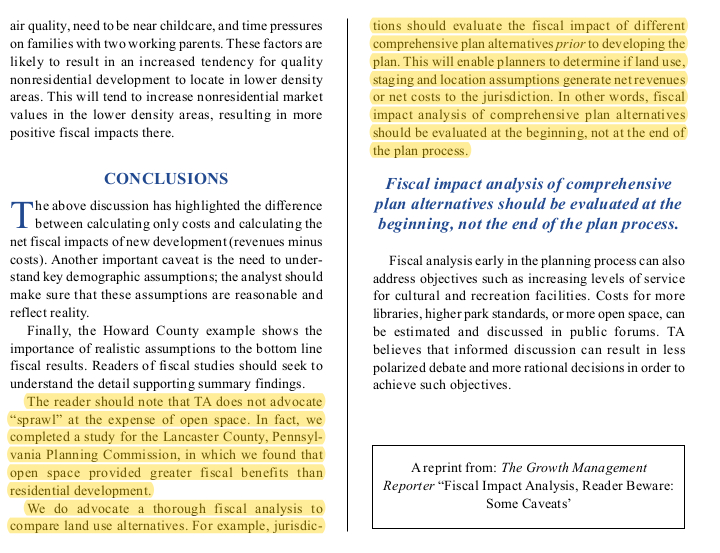
This is an excerpt from Fiscal Impact Analysis: Reader Beware: Some Caveats by Paul Tischler of TischlerBise. This excerpt states that a fiscal analysis should be completed prior to developing the plan (before writing the 2045 Comprehensive Plan Draft). TischlerBise is the consultant that was going to conduct the fiscal analysis. Full document available at the end of the article and on their website.
It is clear from the city’s original queries and the consultant’s proposal that a Fiscal Impact Analysis is an integral part of the comprehensive plan review and update process. Plain old common sense tells the average person that these recommendations for drastic growth should be data-driven. To use the previous analogy, here we are with the City poised to build an addition and they have failed to do the basic cost-benefit analysis we all expect and require from our City officials and city planners. They want to build and then find out how much it will cost us.
The comprehensive plan impacts almost every land use decision the city makes and citizens of Suffolk need to know WHY our city managers and planners think moving forward with almost 25% increase in Growth Areas is warranted. We need the fiscal analysis completed so we can see the long-term impacts of the development proposed in the 2045 Comprehensive Plan. We deserve more than expansion without substantiation. Until we get some clear answers, the city needs to put a pause on the plan.
Let City Council know that you want them to ‘Pause the Plan’ and have the fiscal analysis completed BEFORE adopting the 2045 Comprehensive Plan: council@suffolkva.us
Michael D. Duman, Mayor
mayor@suffolkva.us
Phone: 757-514-4009
Lue R. Ward, Jr., Vice Mayor
(Nansemond Borough)
nansemond@suffolkva.us
Phone: 757-377-6929
Shelley Butler Barlow,
Council Member
(Chuckatuck Borough)
chuckatuck@suffolkva.us
Phone: 757-346-8355
Leroy Bennett, Council Member
(Cypress Borough)
cypress@suffolkva.us
Phone: 757-407-3750
Timothy J. Johnson, Council Member
(Holy Neck Borough)
holyneck@suffolkva.us
Phone: 757-407-0556
Roger W. Fawcett, Council Member
(Sleepy Hole Borough)
sleepyhole@suffolkva.us
Phone: 757-377-8641
John Rector, Council Member
(Suffolk Borough)
suffolk@suffolkva.us
Phone: 757-407-1953
LeOtis Williams, Council Member
(Whaleyville Borough)
whaleyville@suffolkva.us
Phone: 757-402-7100
Supporting Documentation and Additional Reading:
- Request for Proposal (11/2022) for “Review and Update of the 2035 Comprehensive Plan."
- Proposal Review and Update of the Comprehensive Plan by Planning NEXT
- Scope of Work Amendment (August 29, 2023) Planning NEXT
- 2045 Comprehensive Plan DRAFT
- 2045 Comprehensive Plan Appendices
- How Today’s Decisions Affect Tomorrow’s Budgets by L. Carson Bise II
- Fiscal Impact Analysis, Reader Beware: Some Caveats By Paul S. Tischler
- Cost of Land Use Fiscal Impact Analysis Town of Davidson, North Carolina by TischlerBise
- Fiscal Impact Analysis Report Avimor Development, City of Eagle, Idaho by TischlerBise

It’s time to stop paying the bucks . If then they keep letting all the new citizens and development, somebody has to pay for extra schools , roads and repairs to the existing roads. The existing roads are in the terrible shape and has done little with them since the state stopped the maintenance.
Thank you for your comment! If you haven’t yet, can you please take a couple of minutes to email city council (council@suffolkva.us). Let them know how you feel about the development that has been happening in the city and the new comprehensive plan, which will bring more development.